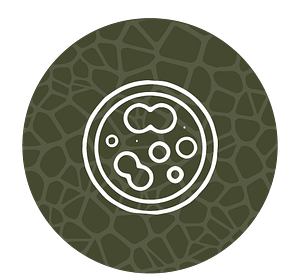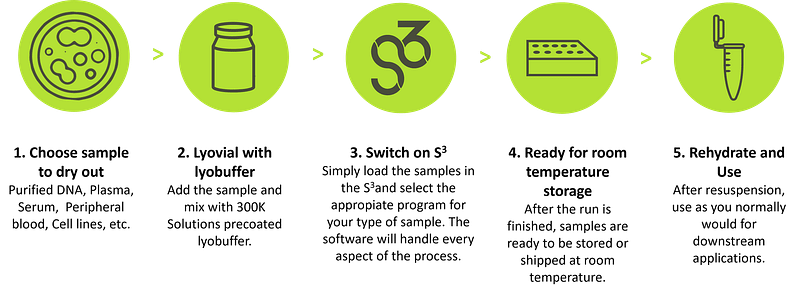
Get rid of constrictions associated with cell culture and maintenance, and stabilise cell line aliquots at room temperature with 300K Cell Line solution adding safety and allowing the extraction of DNA maintaining the same level of sample quality for downstream applications.



The DNA extracted from samples freeze-dried using 300K Cell Lines Solution has been subjected to rigorous quality control to assess DNA purity, integrity and functionality room temperature storage, following the Proficiency Standards stablished by the International Society for Biological and Environmental Repositories (ISBER).
Using DNA extracted from 4 different lymphoproliferative disorders (LPDs) cell lines (H929, CA46, RS4;11 and REH) DNA purity was assessed by spectrophotometry revealing that all four cell lines (aliquots of 5 x 105 cells) showed A260/280 ratio values above 1.6 even after 3 months of RT storage, which indicates absence of protein contamination. Moreover, double-strand DNA quantification by fluorimetry confirmed a good DNA yield in all samples (at least 0,5 µg).
| Sample ID | Time of RT storage | DNA yield (µg) | A260/280 |
|---|---|---|---|
| H929 | Control (T0) | 1.65 | 1.99 |
| 3 months | 2.76 | 1.93 | |
| CA46 | Control (T0) | 1.42 | 1.97 |
| 3 months | 2.59 | 1.88 | |
| RS4;11 | Control (T0) | 0.52 | 1.92 |
| 3 months | 0.94 | 1.81 | |
| REH | Control (T0) | 2.97 | 1.93 |
| 3 months | 1.75 | 1.86 |
To assess DNA functionality and integrity, we performed a multiplex long PCR, and a 17.5 kb band was observed in all four cell lines, even after 3 months of RT storage.

Specifically, we performed the EuroClonality-NDC assay (Univ8 Genomics, Belfast, North Ireland) which is used for the study of Lymphoproliferative disorders (LPD). The reason why we choose this genomic assay is because it uses as validation samples, among others, the four cell lines we have tested.
The metrics obtained in this NGS analysis using DNA from the H929 cell line (aliquots of 106 cells) were within the stablished acceptance criteria. Moreover, the results (shown in the table below) were the expected for this specific cell line.


Coming soon...
Poster: «Use of Freeze-Dried Cell Lines as Controls for Next-Generation Sequencing Studies»
| Cookie | Duración | Descripción |
|---|---|---|
| cookielawinfo-checkbox-analytics | 11 months | This cookie is set by GDPR Cookie Consent plugin. The cookie is used to store the user consent for the cookies in the category "Analytics". |
| cookielawinfo-checkbox-functional | 11 months | The cookie is set by GDPR cookie consent to record the user consent for the cookies in the category "Functional". |
| cookielawinfo-checkbox-necessary | 11 months | This cookie is set by GDPR Cookie Consent plugin. The cookies is used to store the user consent for the cookies in the category "Necessary". |
| cookielawinfo-checkbox-others | 11 months | This cookie is set by GDPR Cookie Consent plugin. The cookie is used to store the user consent for the cookies in the category "Other. |
| cookielawinfo-checkbox-performance | 11 months | This cookie is set by GDPR Cookie Consent plugin. The cookie is used to store the user consent for the cookies in the category "Performance". |
| viewed_cookie_policy | 11 months | The cookie is set by the GDPR Cookie Consent plugin and is used to store whether or not user has consented to the use of cookies. It does not store any personal data. |